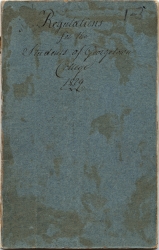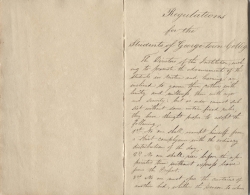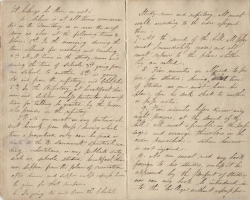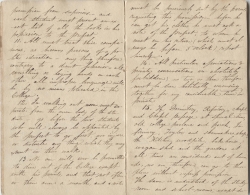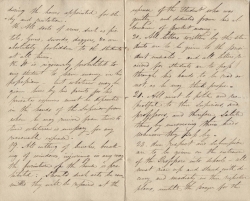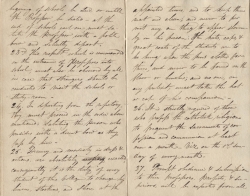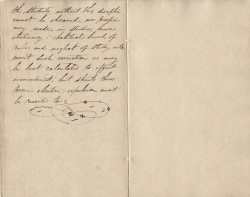This exhibit highlights regulations for the students of Georgetown College which were written in 1829, 40 years after the school’s establishment. Scans of each page are accompanied by transcriptions which maintain original spelling and punctuation; explanatory notes by the University Archivist are included where needed.
The regulations were written for a school with 45 students and a faculty of eight. The only two buildings on campus were the North Building (which we know as Old North) and a smaller building across the Quadrangle from it, the South Building which was razed in 1904 to make way for Ryan Hall. Father Thomas Mulledy, S.J., who would play a leading role in the selling of the 272 enslaved persons owned by Maryland Jesuits in 1838, had just become President and the regulations appear to be written in his hand. (Details about Father Mulledy’s involvement in the 1838 sale can be found in the report of the Working Group on Slavery, Memory, and Reconciliation to the President of Georgetown University, summer 2016.)
While the University Archives contains very little material written in the voice of early students, records such as these regulations provide insight into what life was like for students in the first decades of Georgetown College. From reading them, it becomes clear that student life was relatively regimented, with the Jesuits acting very much in loco parentis. Students were younger at this time - the age threshold for enrolling was just eight years old - which perhaps explains some of the need for so much structure and regimentation.
Page 1
Regulations for the Students of George-town College
The Directors of this Institution, wishing to promote the advancement of the students in virtue and learning, are inclined to govern them rather with levity and mildness, than with rigor and severity : but as order cannot subsist without some certain fixed rules, they have thought proper to adopt the following;
1st. No one shall exempt himself from a strict complyance with the ordinary distribution of the day.
2nd. No one shall rise before the appointed time without express leave from the Prefect.
3rd. No one must open the curtains of anothers bed, whether the person to whom
Archivist’s notes:
The use of the phrase advancement of the students in virtue and learning in the introductory paragraph seems to be an echoing, whether conscious or otherwise, of the language used by John Carroll in his Proposals For Establishing an Academy, at George-Town, Potowmack-River, Maryland, which were circulated in early 1787. The purpose of Carroll’s academy as expressed in the opening line of the Proposals is to unite the Means of communicating Science with an effectual Provision for guarding and improving the Morals of Youth.
One reason why regulations 2 and 3 were important is that all dormitories at Georgetown were open and communal until Healy Hall opened in the 1880s. Healy provided single dorm rooms on its third and fourth floors for seniors who were willing to pay extra for the privilege of sleeping in one.
Pages 2 and 3
it belongs be there or not.
4. Silence is at all times commanded in the Dormitory in or near the necessary as also at the following times & places: 1st In the morning during the time allowed for washing and combing. 2nd at all times in the Study-room and during the time of Schools. 3rd going from one School to another. 4th in going to and from the refectory and Chapel. 5th In the refectory at breakfast dinner and supper unless particular permission for talking be granted by the person who presides in the refectory.
5th. No one must on any pretence absent himself from Mass (during which time a prayerbook only can be read, or visits to the B. Sacrament, spiritual reading, exhortations, or any publick duty, such as schools, studies, breakfast, dinner, supper, from the place of recreation after dinner and supper unless express leave be given for that purpose.
6. In going to and from the Chapel Study-room and refectory, all must walk according to the order assigned them.
7. At the sound of the bell all play must Immediately cease, and all must repair to the place whither they are called.
8. Five minutes are allowed to prepare for studies; during the time of studies no one must leave his place, open his desk speak to another or pass notes.
9. Five minutes before dinner and night prayers, at the sound of the bell, all must assemble in the passage, and arrange themselves in the order prescribed. Silence however is not injoined.
10. No one must read any book foreign to his studies, unless it be approved by the Prefect of Studies; nor can any book be introduced into the College without express per-
Archivist’s notes:
Regulation 4: Necessary is an obsolete word for privy. Students were required to rise early and wash. During warmer months, they had to do so at 5 a.m; in the winter they could go later, at 5:30 a.m. By the time these regulations were created, there was an indoor wash area but before 1822, students had to wash at an outdoor pump.
Regulation 6: Students were placed in order according to height, from the tallest to the shortest. Measurements were taken twice a year to confirm or reassign places in the “Ranks”.
Regulations 7 and 9: Bells were used on campus to communicate to students the timing of rising, classes, meals, recreation, etc. For the Jesuits, bells regulated the timing of prayers and devotions. As late as the late 1930s, a bell attached to the roof of Ryan Hall served that latter purpose.
Regulation 10: In 1829, the College had a library of around 10,000 volumes; however, only seniors were allowed to use it.
Pages 4 and 5
permission from superiors. and each student must present an exact list of all the books in his possession to the Prefect.
11. All must treat their companions, as becomes persons of a polite education. any thing therefore contrary to a decent behavior - all wrestling or laying hands on each other, all improper language will be by no means tolerated in this College.
12. In walking out none must separate from the mean body of the students - go before the two students who will always be appointed by the prefect to go first, nor injure or disturb any thing, which they may meet in their walks.
13. No one will ever be permitted to dine out of the College except with his parents, and that not oftener than once a month, and a note must be previously sent by the parents requesting this permission - before he can get his clothes he must ask a note of the Prefect, to whom he must on his return (which must always be before 5 o’clock) report himself.
14. All particular associations & private conversations are absolutely forbidden; no two or three therefore must be seen habitually conversing together for any considerable time in private.
15. The Dormitory, Refectory, chapel and Chapel passage at special times, old college parlour and porch, Infirmary, Taylors and shoemakers shop, the Kitchen, woodpile, bakehouse, wagon shed and the gardens at all times are considered out of bounds. no one, therefore, can go to these places without express permission - The same is understood of the Study-room and school-rooms, except du-
Archivist’s notes:
Regulation 12: Groups of students were from time to time allowed to leave campus on day trips. They would walk to locations such as the Capitol or the Supreme Court to observe proceedings. They were not, however, allowed to go alone and were always accompanied by a prefect (usually a younger Jesuit).
Regulation 13: While students whose parents lived locally could at least see their parents once a month, if the correct protocols were followed, students whose homes were further away were permitted to leave the College only once per year during the “great”, i.e. summer, vacation.
Regulation 15: The old college would have been the South Building, the academic building constructed on campus. It was razed in 1904 and replaced by Ryan Hall.
Pages 6 and 7
during the hours appointed for study and recitation.
16. All sorts of arms, such as pistols, Guns, swords, daggers, etc. are absolutely forbidden to the students at all times.
18.It is rigorously prohibited to any student to have money in his possession - but whatever may be given to him by his parents for his private expenses must be deposited in the hands of the Superior from whom he may receive from time to time whatever is necessary for any reasonable expenses.
19. All cutting of benches, breaking of windows, injuring in any way the furniture of the house is prohibited : Should such acts be committed they will be repaired at the expense of the student who was guilty, and deducted from his allowance of pocket money.
20. All letters written by the students are to be given to the President unsealed - and all letters received for students are to pass through his hands to be read or not, as he may think proper.
21. All must be polite and respectful to their Superiors, and professors, and therefore Salute them by uncovering their heads whenever they pass by.
22. due respect and submission are to be given on the entrance of the Professors into schools - all must rise up and stand with decency and modesty in their respective places, until the prayer for the
Archivist’s notes:
Regulation 18: Because students could not have money in their possession, College authorities held all student funds and as a result had to create and maintain very detailed financial records to document literally every cent that was credited or debited against every student account. These records, which take the form of chronologically arranged ledgers, encompass every aspect of early student life at Georgetown from haircuts, to textbook purchases, to drawing lessons and are available to researchers through the University Archives. Portions of them are available online. The College did distribute pocket money weekly but set a limit of 12 1/2 cents per week.
Pages 8 and 9
beginning of schools be said, or until the Professor be seated - at the end of schools each one must salute the Professor with a polite bow and Silently depart.
23rd. The respect which is commanded on the entrance of Professors into school, must also be observed by all in case that strangers should be conducted to visit the schools or Study-room.
24. In departing from the refectory, they must proceed in the order above mentioned : saluting the person who presides with a decent bow as they pass by him.
25. Decency and modesty in dress & actions, are absolutely exacted, consequently it is the duty of every student of this College to change his linen, stockens, and shoes, at the appointed times, and to keep them neat and clean; and never to permit any one thing to appear slovenly in his person : The hats, caps, & great coats of the students are to be hung upon the pins alotted for them, and never to be found on the floor or benches; and no one, on any pretext, must take the hat or cap of his companion.
26. It is strictly required of those who profess the catholick religion to frequent the Sacraments of confession and communion at least once a month - viz on the 1st Sunday of every month.
27. Prompt obedience & submission to their professors, Prefects, & superiors, will be expected from all
Archivist’s notes:
Regulation 25: The 1829 Prospectus informed parents that they should send the following items with their sons: one suit of clothes, as a uniform-which is, in winter, a blue cloth coat and pantaloons with a black velvet waistcoat; in summer, white pantaloons with a black silk waistcoat are used. He must likewise bring with him two suits for daily wear, for which no particular colour is prescribed; six shirts, six pair of stockings, six pocket handkerchiefs, three pair of shoes, a hat and a cloak or great coat, also a silver spoon.
Regulation 26: Note that this is directed toward those who profess the catholick religion. Not all Georgetown students were Catholic, even in the early decades of the College. John Carroll stated in his Proposals For Establishing an Academy, at George-Town, Potowmack-River, Maryland, written ca. 1787, that his school was to be open to those of every religious profession.
Page 10
the students, without this, disciplin cannot be observed, nor proficiency made in studies; hence obstinacy, habitual breach of rule and neglect of study, will merit such correction as may be best calculated to effect ammendment; but should these prove abortive expulsion must be resorted to.
Archivist’s note:
Punishment short of expulsion is not articulated in the rules. A very common punishment involved memorizing and reciting Latin passages in the refectory during dinner. Corporal punishment was also employed.
Curated by Lynn Conway, University Archivist

